Engerman S.L., Gallman R.E. The Cambridge Economic History of the United States, Vol. 1: The Colonial Era
Подождите немного. Документ загружается.

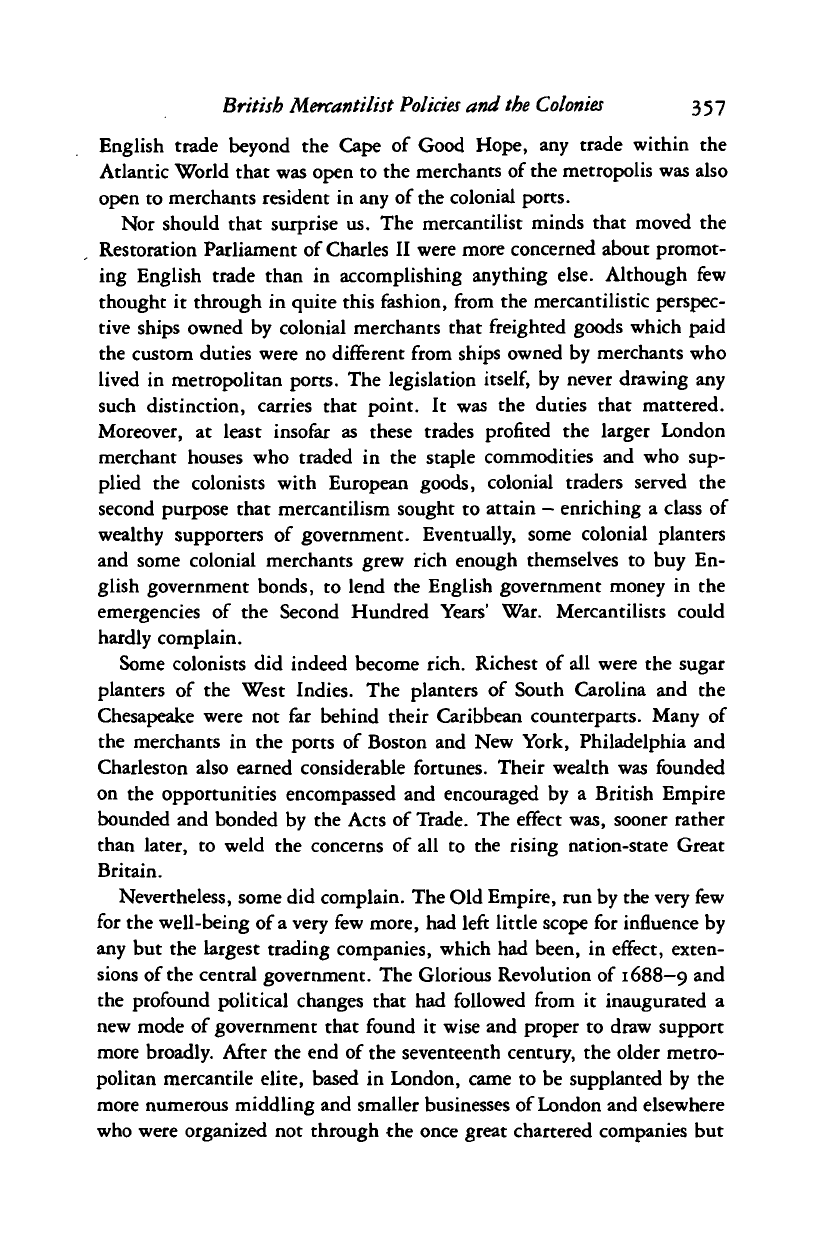
British Mercantilist
Policies
and
the Colonies
357
English trade beyond the Cape of Good Hope, any trade within the
Atlantic World that was open to the merchants of the metropolis was also
open to merchants resident in any of the colonial ports.
Nor should that surprise us. The mercantilist minds that moved the
Restoration Parliament of Charles II were more concerned about promot-
ing English trade than in accomplishing anything else. Although few
thought it through in quite this fashion, from the mercantilistic perspec-
tive ships owned by colonial merchants that freighted goods which paid
the custom duties were no different from ships owned by merchants who
lived in metropolitan ports. The legislation
itself,
by never drawing any
such distinction, carries that point. It was the duties that mattered.
Moreover, at least insofar as these trades profited the larger London
merchant houses who traded in the staple commodities and who sup-
plied the colonists with European goods, colonial traders served the
second purpose that mercantilism sought to attain - enriching a class of
wealthy supporters of government. Eventually, some colonial planters
and some colonial merchants grew rich enough themselves to buy En-
glish government bonds, to lend the English government money in the
emergencies of the Second Hundred Years' War. Mercantilists could
hardly complain.
Some colonists did indeed become rich. Richest of all were the sugar
planters of the West Indies. The planters of South Carolina and the
Chesapeake were not far behind their Caribbean counterparts. Many of
the merchants in the ports of Boston and New York, Philadelphia and
Charleston also earned considerable fortunes. Their wealth was founded
on the opportunities encompassed and encouraged by a British Empire
bounded and bonded by the Acts of
Trade.
The effect was, sooner rather
than later, to weld the concerns of all to the rising nation-state Great
Britain.
Nevertheless, some did complain. The Old Empire, run by the very few
for the well-being of
a
very few more, had left little scope for influence by
any but the largest trading companies, which had been, in effect, exten-
sions of the central government. The Glorious Revolution of 1688—9
an<
^
the profound political changes that had followed from it inaugurated a
new mode of government that found it wise and proper to draw support
more broadly. After the end of the seventeenth century, the older metro-
politan mercantile elite, based in London, came to be supplanted by the
more numerous middling and smaller businesses of London and elsewhere
who were organized not through the once great chartered companies but
Cambridge Histories Online © Cambridge University Press, 2008
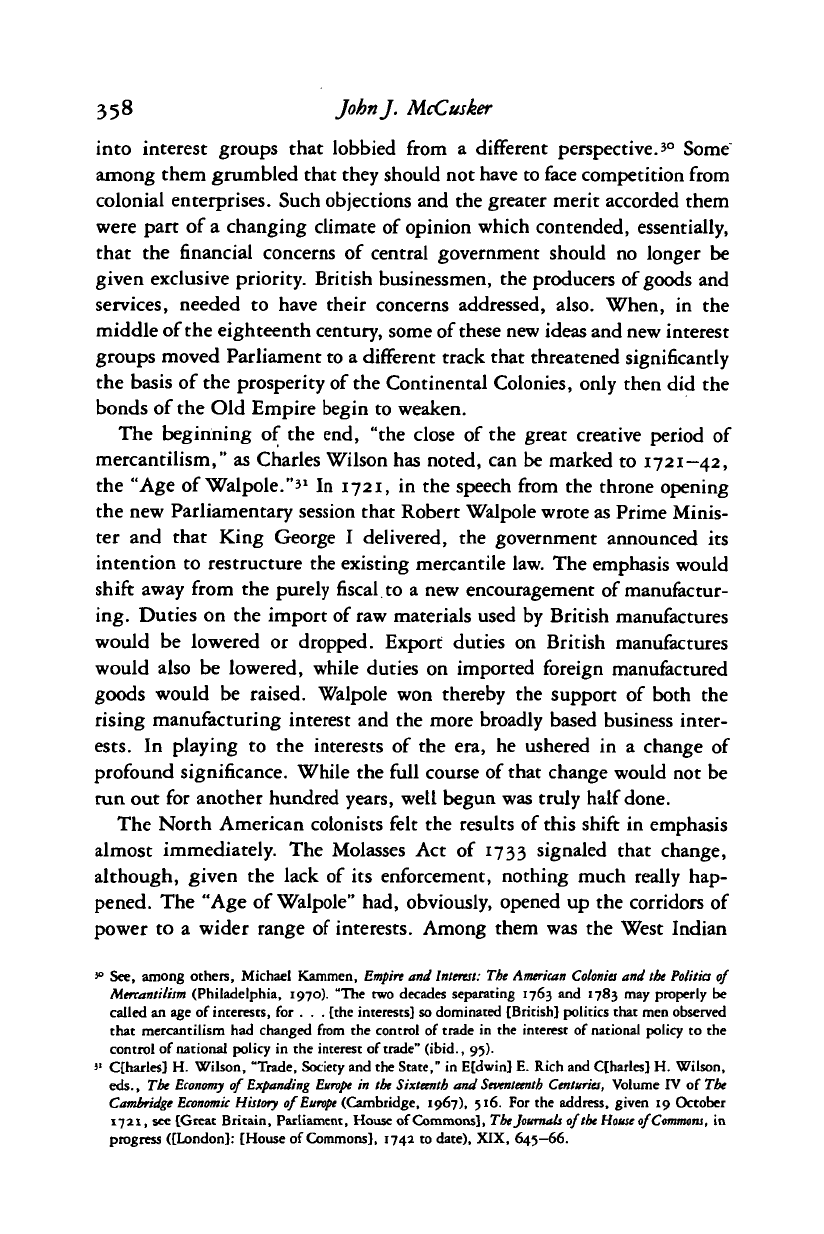
358
JohnJ.
McCusker
into interest groups that lobbied from a different perspective.'
0
Some
among them grumbled that they should not have to face competition from
colonial enterprises. Such objections and the greater merit accorded them
were part of a changing climate of opinion which contended, essentially,
that the financial concerns of central government should no longer be
given exclusive priority. British businessmen, the producers of
goods
and
services, needed to have their concerns addressed, also. When, in the
middle of the eighteenth century, some of these new ideas and new interest
groups moved Parliament to a different track that threatened significantly
the basis of the prosperity of the Continental Colonies, only then did the
bonds of the Old Empire begin to weaken.
The beginning of the end, "the close of the great creative period of
mercantilism," as Charles Wilson has noted, can be marked to 1721—42,
the "Age of Walpole.
"3
1
In 1721, in the speech from the throne opening
the new Parliamentary session that Robert Walpole wrote as Prime Minis-
ter and that King George I delivered, the government announced its
intention to restructure the existing mercantile law. The emphasis would
shift away from the purely fiscal, to a new encouragement of manufactur-
ing. Duties on the import of raw materials used by British manufactures
would be lowered or dropped. Export duties on British manufactures
would also be lowered, while duties on imported foreign manufactured
goods would be raised. Walpole won thereby the support of both the
rising manufacturing interest and the more broadly based business inter-
ests.
In playing to the interests of the era, he ushered in a change of
profound significance. While the full course of that change would not be
run out for another hundred years, well begun was truly half done.
The North American colonists felt the results of this shift in emphasis
almost immediately. The Molasses Act of 1733 signaled that change,
although, given the lack of its enforcement, nothing much really hap-
pened. The "Age of
Walpole"
had, obviously, opened up the corridors of
power to a wider range of interests. Among them was the West Indian
•" See, among others, Michael Kammcn,
Empire
and
Interest:
The
American Colonies
and the Politics of
Mercantilism (Philadelphia, 1970). "The two decades separating 1763 and 1783 may properly be
called an age of interests, for ... [the interests] so dominated [British] politics that men observed
that mercantilism had changed from the control of trade in the interest of national policy to the
control of national policy in the interest of
trade"
(ibid., 9;).
»' C[harles] H. Wilson, "Trade, Society and the State," in E[dwin] E. Rich and Qharles] H. Wilson,
eds.,
The
Economy
of Expanding
Europe
in the Sixteenth and
Seventeenth
Centuries, Volume IV of The
Cambridge
Economic
History of
Europe
(Cambridge, 1967), 516. For the address, given 19 October
1721,
see [Great Britain, Parliament, House of
Commons],
The Journals of the Home of
Commons,
in
progress ([London]: [House of
Commons],
1742 to date), XIX, 645—66.
Cambridge Histories Online © Cambridge University Press, 2008
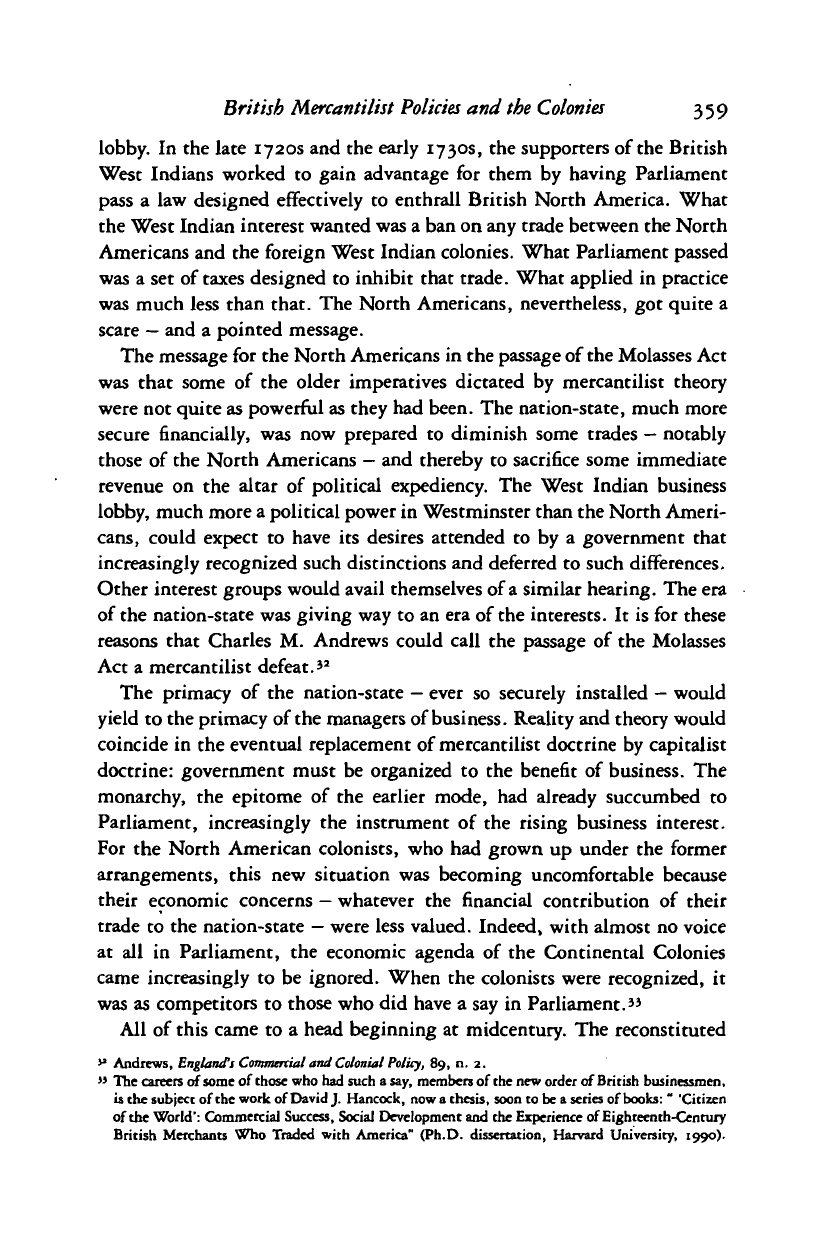
British Mercantilist
Policies
and
the Colonies
359
lobby. In the late 1720s and the early 1730s, the supporters of the British
West Indians worked to gain advantage for them by having Parliament
pass a law designed effectively to enthrall British North America. What
the West Indian interest wanted was a ban on any trade between the North
Americans and the foreign West Indian colonies. What Parliament passed
was a set of taxes designed to inhibit that trade. What applied in practice
was much less than that. The North Americans, nevertheless, got quite a
scare
—
and a pointed message.
The message for the North Americans in the passage of the Molasses Act
was that some of the older imperatives dictated by mercantilist theory
were not quite as powerful as they had been. The nation-state, much more
secure financially, was now prepared to diminish some trades
—
notably
those of the North Americans - and thereby to sacrifice some immediate
revenue on the altar of political expediency. The West Indian business
lobby, much more a political power in Westminster than the North Ameri-
cans,
could expect to have its desires attended to by a government that
increasingly recognized such distinctions and deferred to such differences.
Other interest groups would avail themselves of a similar hearing. The era
of the nation-state was giving way to an era of the interests. It is for these
reasons that Charles M. Andrews could call the passage of the Molasses
Act a mercantilist defeat.**
The primacy of the nation-state
—
ever so securely installed - would
yield to the primacy of the managers of business. Reality and theory would
coincide in the eventual replacement of mercantilist doctrine by capitalist
doctrine: government must be organized to the benefit of business. The
monarchy, the epitome of the earlier mode, had already succumbed to
Parliament, increasingly the instrument of the rising business interest.
For the North American colonists, who had grown up under the former
arrangements, this new situation was becoming uncomfortable because
their economic concerns - whatever the financial contribution of their
trade to the nation-state
—
were less valued. Indeed, with almost no voice
at all in Parliament, the economic agenda of the Continental Colonies
came increasingly to be ignored. When the colonists were recognized, it
was as competitors to those who did have a say in Parliament."
All of this came to a head beginning at midcentury. The reconstituted
>' Andrews, England's
Commercial
and
Colonial
Policy,
89, n. 2.
" The careers of some of chose who had such a say, members of the new order of British businessmen,
is the subject of the work of David J. Hancock, now a thesis, soon to be a series of
books:
" 'Citizen
of the World': Commercial Success, Social Development and the Experience of Eighteenth-Century
British Merchants Who Traded with America" (Ph.D. dissertation, Harvard University, 1990).
Cambridge Histories Online © Cambridge University Press, 2008
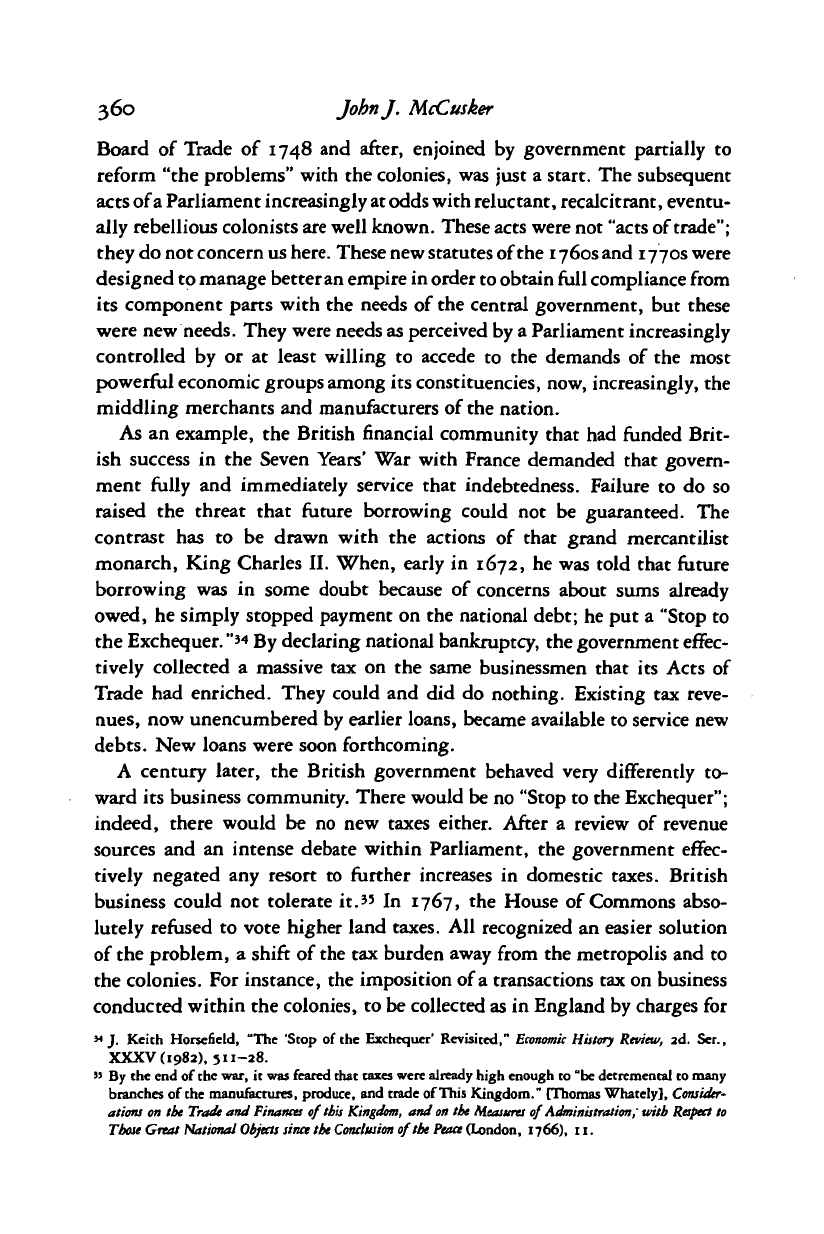
360
JohnJ.
McCusker
Board of Trade of 1748 and after, enjoined by government partially to
reform "the problems" with the colonies, was just a start. The subsequent
acts
of
a
Parliament increasingly
at odds
with reluctant, recalcitrant, eventu-
ally rebellious colonists
are
well known. These
acts
were not "acts of trade";
they do not concern us
here.
These new statutes of the
1760s
and 1770s were
designed to manage better
an
empire
in
order
to
obtain full compliance from
its component parts with the needs of the central government, but these
were new needs. They were needs as perceived by a Parliament increasingly
controlled by or at least willing to accede to the demands of the most
powerful economic groups among its constituencies, now, increasingly, the
middling merchants and manufacturers of the nation.
As an example, the British financial community that had funded Brit-
ish success in the Seven Years' War with France demanded that govern-
ment fully and immediately service that indebtedness. Failure to do so
raised the threat that future borrowing could not be guaranteed. The
contrast has to be drawn with the actions of that grand mercantilist
monarch, King Charles II. When, early in 1672, he was told that future
borrowing was in some doubt because of concerns about sums already
owed, he simply stopped payment on the national debt; he put a "Stop to
the Exchequer.
"
34
By declaring national bankruptcy, the government effec-
tively collected a massive tax on the same businessmen that its Acts of
Trade had enriched. They could and did do nothing. Existing tax reve-
nues,
now unencumbered by earlier loans, became available to service new
debts.
New loans were soon forthcoming.
A century later, the British government behaved very differently to-
ward its business community. There would be no "Stop to the Exchequer";
indeed, there would be no new taxes either. After a review of revenue
sources and an intense debate within Parliament, the government effec-
tively negated any resort to further increases in domestic taxes. British
business could not tolerate it." In 1767, the House of Commons abso-
lutely refused to vote higher land taxes. All recognized an easier solution
of the problem, a shift of
the
tax burden away from the metropolis and to
the colonies. For instance, the imposition of a transactions tax on business
conducted within the colonies, to be collected as in England by charges for
» J. Keith Horsefield, "The 'Stop of the Exchequer' Revisited,"
Economic
History Review, id. Ser.,
XXXV (1982), 511-28.
» By the end of the war, it was feared that taxes were already high enough to "be detremental to many
branches of the manufactures, produce, and trade of This Kingdom." [Thomas Whately],
Consider-
ations on the Trade and
Finances
of
this
Kingdom, and
on
the
Measures
of Administration,' with
Respect
to
Those
Great National
Objects since
tbt
Conclusion
of
the Peace
(London, 1766), 11.
Cambridge Histories Online © Cambridge University Press, 2008
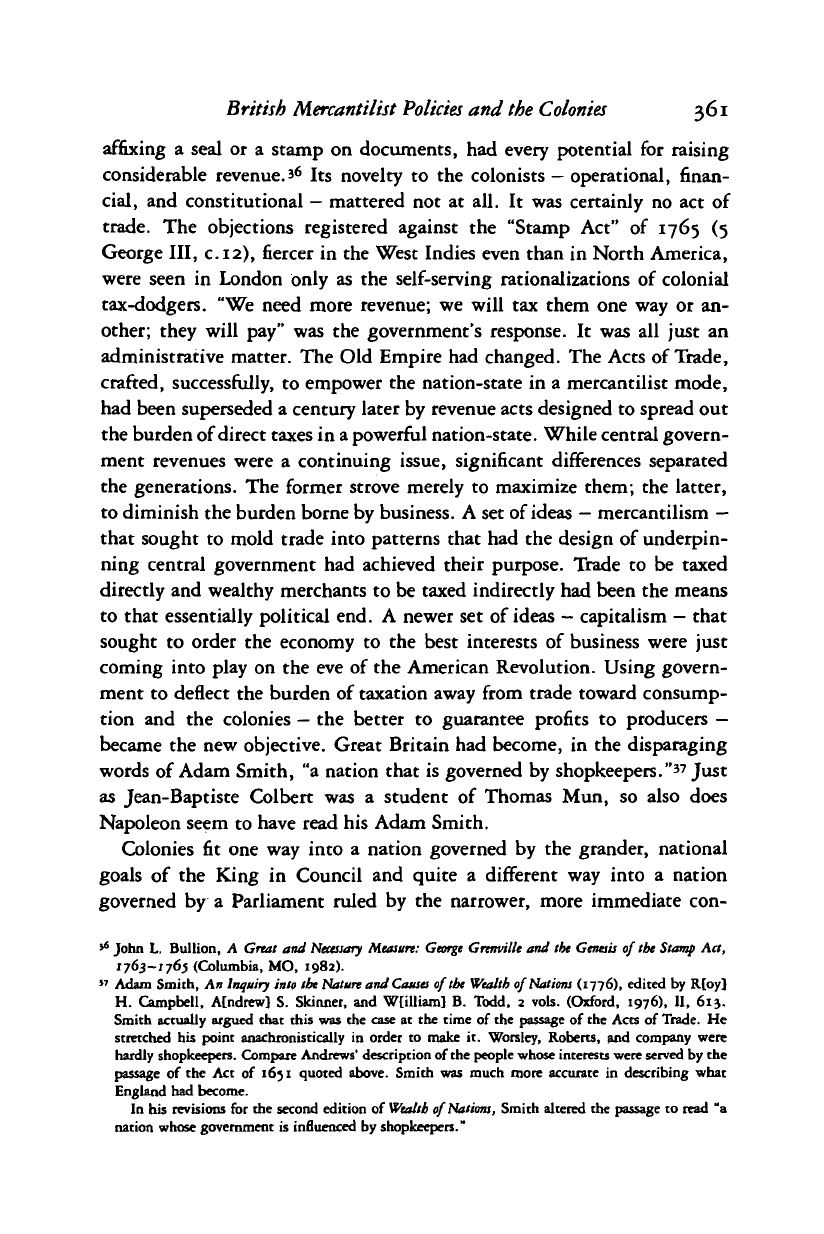
British Mercantilist
Policies
and
the Colonies
361
affixing a seal or a stamp on documents, had every potential for raising
considerable
revenue.
*
6
Its novelty to the colonists - operational, finan-
cial, and constitutional - mattered not at all. It was certainly no act of
trade. The objections registered against the "Stamp Act" of 1765 (5
George HI,
c.
12),
fiercer in the West Indies even than in North America,
were seen in London only as the self-serving rationalizations of colonial
tax-dodgers. "We need more revenue; we will tax them one way or an-
other; they will pay" was the government's response. It was all just an
administrative matter. The Old Empire had changed. The Acts of Trade,
crafted, successfully, to empower the nation-state in a mercantilist mode,
had been superseded a century later by revenue acts designed to spread out
the burden of direct taxes in
a
powerful nation-state. While central govern-
ment revenues were a continuing issue, significant differences separated
the generations. The former strove merely to maximize them; the latter,
to diminish the burden borne by business. A set of ideas - mercantilism
—
that sought to mold trade into patterns that had the design of underpin-
ning central government had achieved their purpose. Trade to be taxed
directly and wealthy merchants to be taxed indirectly had been the means
to that essentially political end. A newer set of ideas
—
capitalism
—
that
sought to order the economy to the best interests of business were just
coming into play on the eve of the American Revolution. Using govern-
ment to deflect the burden of taxation away from trade toward consump-
tion and the colonies - the better to guarantee profits to producers -
became the new objective. Great Britain had become, in the disparaging
words of Adam Smith, "a nation that is governed by shopkeepers."
37
Just
as Jean-Baptiste Colbert was a student of Thomas Mun, so also does
Napoleon seem to have read his Adam Smith.
Colonies fit one way into a nation governed by the grander, national
goals of the King in Council and quite a different way into a nation
governed by a Parliament ruled by the narrower, more immediate con-
56
John L. Bullion, A Great and
Necessary
Measure:
George
Grerwille and the
Genesis
of the Stamp Act,
1763-1765 (Columbia, MO, 1982).
« Adam Smith, An Inquiry into the Nature and
Causes
of
the
Wealth of Nations (1776), edited by R[oy]
H. Campbell, A[ndrew] S. Skinner, and W[illiam] B. Todd, 2 vols. (Oxford, 1976), II, 613.
Smith actually argued that this was the case at the time of the passage of the Acts of Trade. He
stretched his point anachronistically in order to make it. Worsley, Roberts, and company were
hardly shopkeepers. Compare Andrews' description of the people whose interests were served by the
passage of the Act of 1651 quoted above. Smith was much more accurate in describing what
England had become.
In his revisions for the second edition of Wealth of
Nations,
Smith altered the passage to read "a
nation whose government is influenced by shopkeepers."
Cambridge Histories Online © Cambridge University Press, 2008
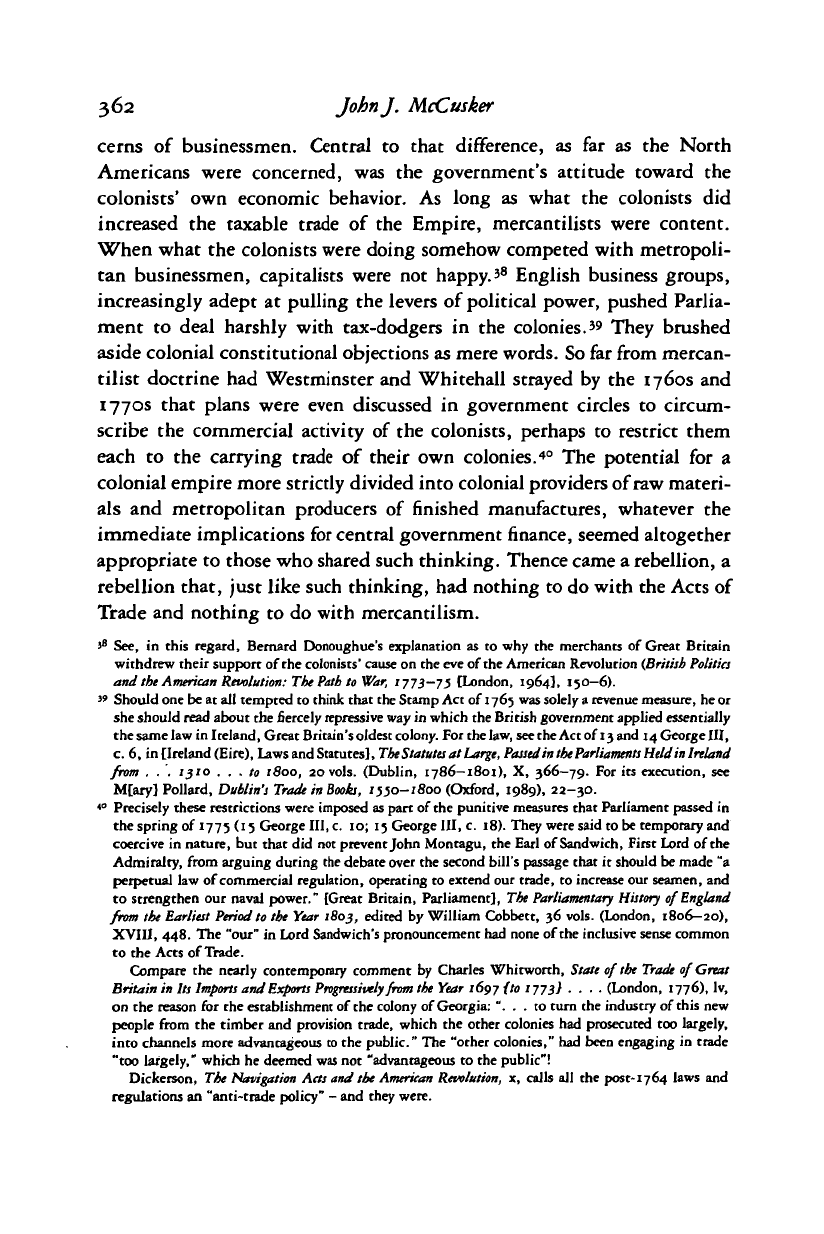
362
JohnJ.
McCusker
cerns of businessmen. Central to that difference, as far as the North
Americans were concerned, was the government's attitude toward the
colonists' own economic behavior. As long as what the colonists did
increased the taxable trade of the Empire, mercantilists were content.
When what the colonists were doing somehow competed with metropoli-
tan businessmen, capitalists were not happy.'
8
English business groups,
increasingly adept at pulling the levers of political power, pushed Parlia-
ment to deal harshly with tax-dodgers in the colonies.
39
They brushed
aside colonial constitutional objections as mere words.
So
far from mercan-
tilist doctrine had Westminster and Whitehall strayed by the 1760s and
1770s that plans were even discussed in government circles to circum-
scribe the commercial activity of the colonists, perhaps to restrict them
each to the carrying trade of their own colonies.
40
The potential for a
colonial empire more strictly divided into colonial providers of raw materi-
als and metropolitan producers of finished manufactures, whatever the
immediate implications for central government finance, seemed altogether
appropriate to those who shared such thinking. Thence came a rebellion, a
rebellion that, just like such thinking, had nothing to do with the Acts of
Trade and nothing to do with mercantilism.
'
B
See, in this regard, Bernard Donoughue's explanation as to why the merchants of Great Britain
withdrew their support of the colonists' cause on the eve of the American Revolution (British Politics
and the American Revolution: The
Path
to
War,
1773-75 {London,
1964],
150-6).
» Should one be at all tempted to think that the Stamp Act of 1765 was solely a revenue measure, he or
she should read about the fiercely repressive way in which the British government applied essentially
the same law in Ireland, Great Britain's oldest colony. For the law, see the Act of
13
and 14 George III,
c. 6, in [Ireland (Eire), Laws and Statutes],
The
Statutes
at
Large,
Passed in
the
Parliaments
Held in Ireland
from . . . 1310 . . . to 1800, 20 vols. (Dublin, 1786—1801), X, 366—79. For its execution, see
M[ary] Pollard, Dublin's Trade in
Books,
1550-1800 (Oxford, 1989), 22-30.
<f Precisely these restrictions were imposed as part of the punitive measures that Parliament passed in
the spring of 1775 (15 George III, c. 10; 15 George III, c. 18). They were said to be temporary and
coercive in nature, but that did not prevent John Montagu, the Earl of Sandwich, First Lord of the
Admiralty, from arguing during the debate over the second bill's passage that it should be made "a
perpetual law of commercial regulation, operating to extend our trade, to increase our seamen, and
to strengthen our naval power." [Great Britain, Parliament], The Parliamentary History of England
from the Earliest Period to the Year 1803, edited by William Cobbett, 36 vols. (London, 1806-20),
XVIII, 448. The "our" in Lord Sandwich's pronouncement had none of the inclusive sense common
to the Acts of Trade.
Compare the nearly contemporary comment by Charles Whitworth, State of
the
Trade of Great
Britain
in
Its
Imports
and
Exports Progressively from
the
Year
1697
{to
1773)
....
(London, 1776), lv,
on the reason for the establishment of the colony of Georgia: "... to turn the industry of this new
people from the timber and provision trade, which the other colonies had prosecuted too largely,
into channels more advantageous to the public." The "other colonies," had been engaging in trade
"too largely," which he deemed was not "advantageous to the public"!
Dickerson, The Navigation Acts and the
American
Revolution, x, calls all the post-1764 laws and
regulations an "anti-trade policy" - and they were.
Cambridge Histories Online © Cambridge University Press, 2008
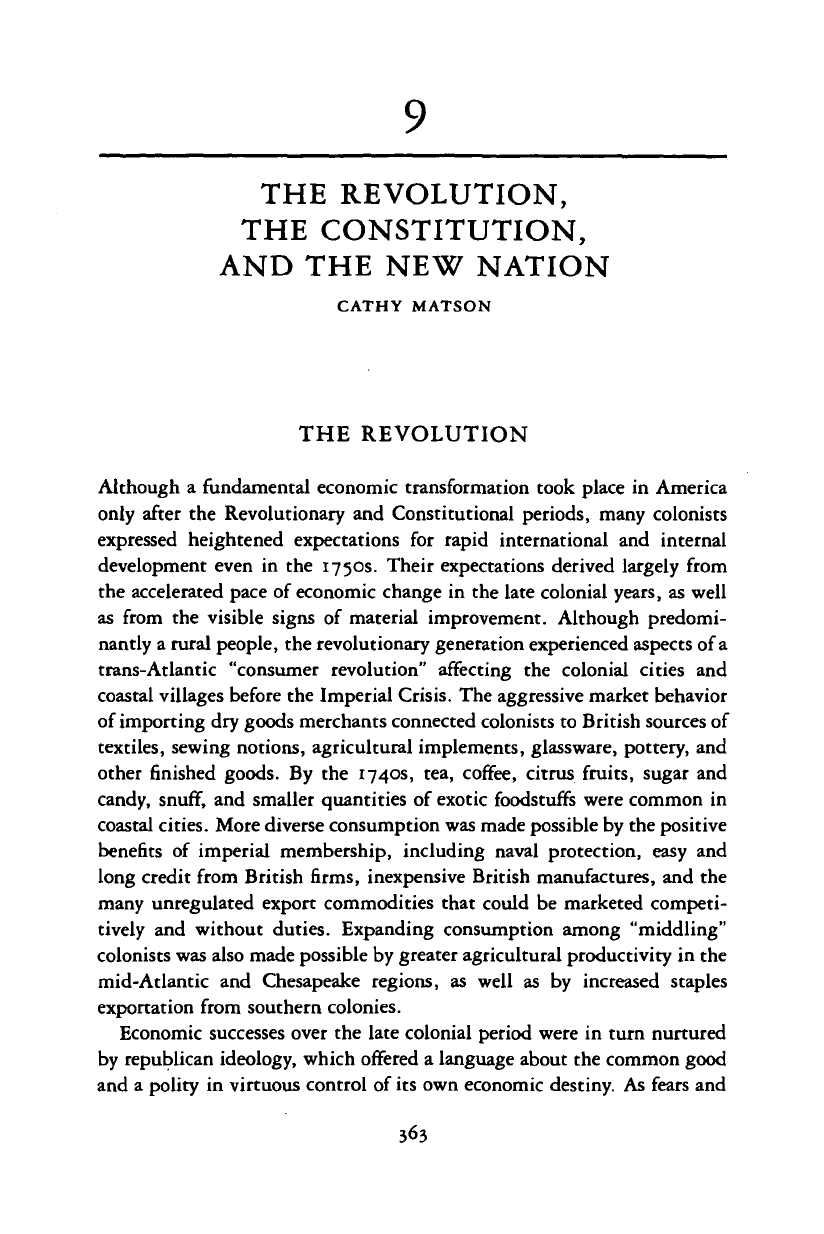
THE REVOLUTION,
THE CONSTITUTION,
AND THE NEW NATION
CATHY MATSON
THE REVOLUTION
Although a fundamental economic transformation took place in America
only after the Revolutionary and Constitutional periods, many colonists
expressed heightened expectations for rapid international and internal
development even in the 1750s. Their expectations derived largely from
the accelerated pace of economic change in the late colonial years, as well
as from the visible signs of material improvement. Although predomi-
nantly a rural people, the revolutionary generation experienced aspects of a
trans-Atlantic "consumer revolution" affecting the colonial cities and
coastal villages before the Imperial Crisis. The aggressive market behavior
of importing dry goods merchants connected colonists to British sources of
textiles, sewing notions, agricultural implements, glassware, pottery, and
other finished goods. By the 1740s, tea, coffee, citrus fruits, sugar and
candy,
snuff,
and smaller quantities of exotic foodstuffs were common in
coastal cities. More diverse consumption was made possible by the positive
benefits of imperial membership, including naval protection, easy and
long credit from British firms, inexpensive British manufactures, and the
many unregulated export commodities that could be marketed competi-
tively and without duties. Expanding consumption among "middling"
colonists was also made possible by greater agricultural productivity in the
mid-Atlantic and Chesapeake regions, as well as by increased staples
exportation from southern colonies.
Economic successes over the late colonial period were in turn nurtured
by republican ideology, which offered a language about the common good
and a polity in virtuous control of its own economic destiny. As fears and
363
Cambridge Histories Online © Cambridge University Press, 2008
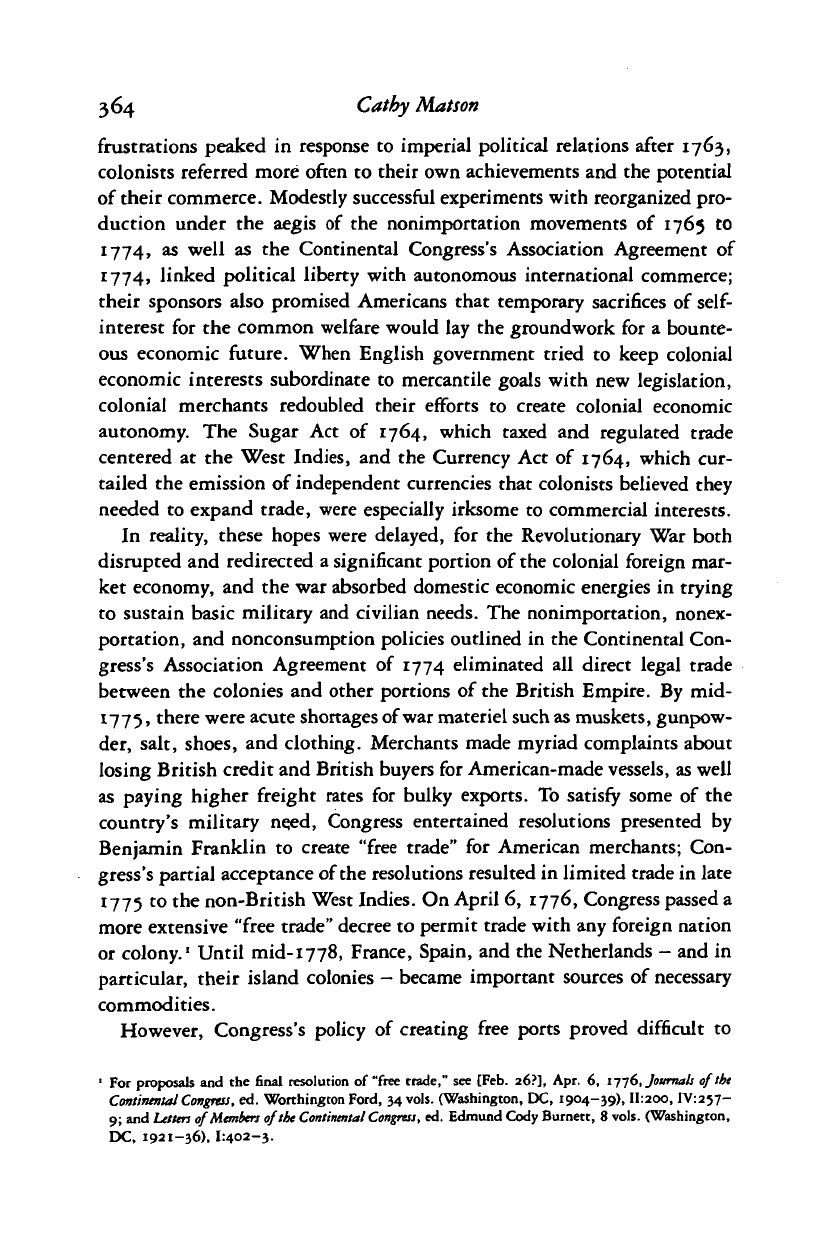
364 Cathy Matson
frustrations peaked in response to imperial political relations after 1763,
colonists referred more often to their own achievements and the potential
of their commerce. Modestly successful experiments with reorganized pro-
duction under the aegis of the nonimportation movements of 1765 to
1774,
as well as the Continental Congress's Association Agreement of
1774,
linked political liberty with autonomous international commerce;
their sponsors also promised Americans that temporary sacrifices of
self-
interest for the common welfare would lay the groundwork for a bounte-
ous economic future. When English government tried to keep colonial
economic interests subordinate to mercantile goals with new legislation,
colonial merchants redoubled their efforts to create colonial economic
autonomy. The Sugar Act of 1764, which taxed and regulated trade
centered at the West Indies, and the Currency Act of 1764, which cur-
tailed the emission of independent currencies that colonists believed they
needed to expand trade, were especially irksome to commercial interests.
In reality, these hopes were delayed, for the Revolutionary War both
disrupted and redirected a significant portion of the colonial foreign mar-
ket economy, and the war absorbed domestic economic energies in trying
to sustain basic military and civilian needs. The nonimportation, nonex-
portation, and nonconsumption policies outlined in the Continental Con-
gress's Association Agreement of 1774 eliminated all direct legal trade
between the colonies and other portions of the British Empire. By mid-
1775,
there were acute shortages of war materiel such
as
muskets, gunpow-
der, salt, shoes, and clothing. Merchants made myriad complaints about
losing British credit and British buyers for American-made vessels,
as
well
as paying higher freight rates for bulky exports. To satisfy some of the
country's military need, Congress entertained resolutions presented by
Benjamin Franklin to create "free trade" for American merchants; Con-
gress's partial acceptance of the resolutions resulted in limited trade in late
1775 to the non-British West Indies. On April 6, 1776, Congress passed a
more extensive "free trade" decree to permit trade with any foreign nation
or colony.
1
Until mid-1778, France, Spain, and the Netherlands - and in
particular, their island colonies
—
became important sources of necessary
commodities.
However, Congress's policy of creating free ports proved difficult to
1
For
proposals
and the
final resolution
of
"free trade,"
see
{Feb. 26?],
Apr. 6,
1776,
Journals
of the
Continental
Congress,
ed. Worthington Ford, 34 vols. (Washington, DC, 1904-39), H:2oo, IV:257-
9; and
Letters
of
Members
of
the Continental
Congress,
ed.
Edmund Cody Burnett,
8
vols. (Washington,
DC,
1921-36), 1:402-3.
Cambridge Histories Online © Cambridge University Press, 2008
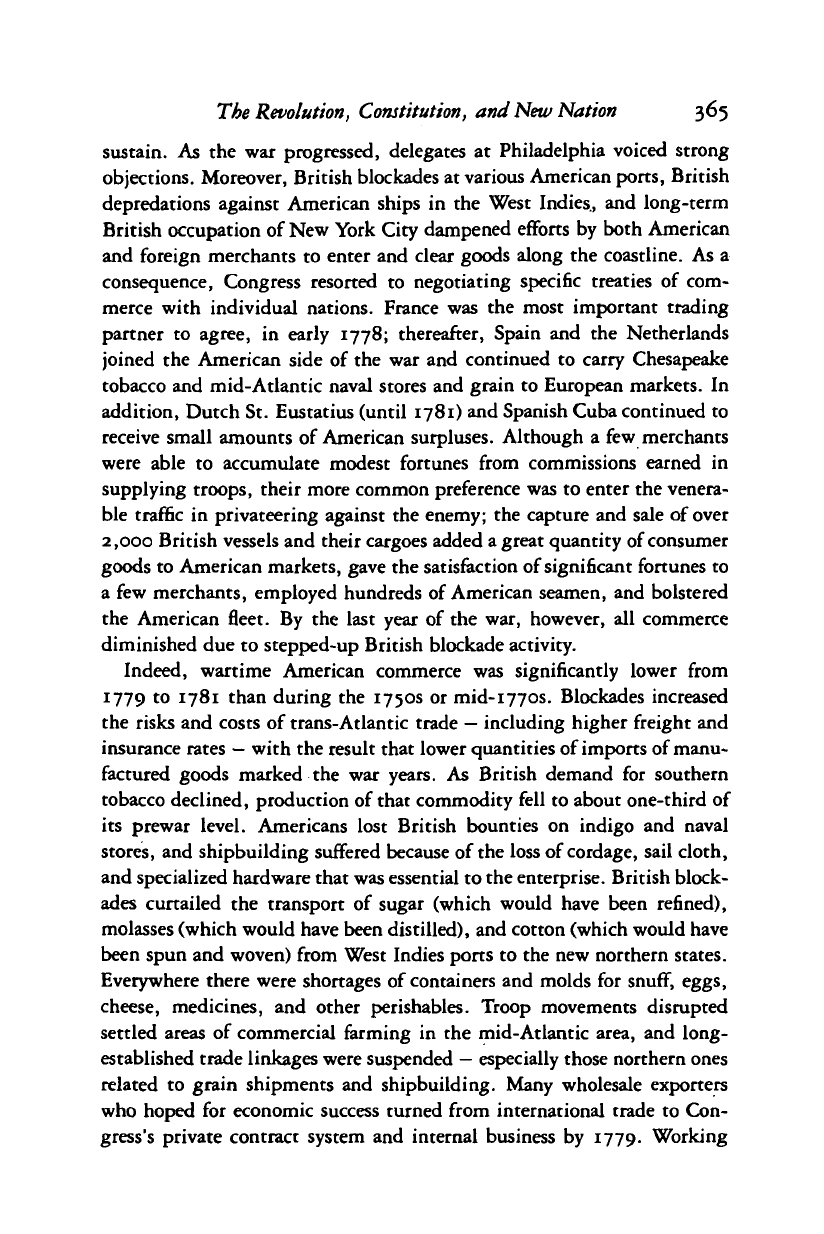
The Revolution, Constitution, and New Nation 365
sustain. As the war progressed, delegates at Philadelphia voiced strong
objections. Moreover, British blockades at various American ports, British
depredations against American ships in the West Indies., and long-term
British occupation of New York City dampened efforts by both American
and foreign merchants to enter and clear goods along the coastline. As a
consequence, Congress resorted to negotiating specific treaties of com-
merce with individual nations. France was the most important trading
partner to agree, in early 1778; thereafter, Spain and the Netherlands
joined the American side of the war and continued to carry Chesapeake
tobacco and mid-Atlantic naval stores and grain to European markets. In
addition, Dutch St. Eustatius (until 1781) and Spanish Cuba continued to
receive small amounts of American surpluses. Although a few merchants
were able to accumulate modest fortunes from commissions earned in
supplying troops, their more common preference was to enter the venera-
ble traffic in privateering against the enemy; the capture and sale of over
2,000 British vessels and their cargoes added a great quantity of consumer
goods to American markets, gave the satisfaction of significant fortunes to
a few merchants, employed hundreds of American seamen, and bolstered
the American fleet. By the last year of the war, however, all commerce
diminished due to stepped-up British blockade activity.
Indeed, wartime American commerce was significantly lower from
1779 to 1781 than during the 1750s or mid-i77os. Blockades increased
the risks and costs of trans-Atlantic trade
—
including higher freight and
insurance rates - with the result that lower quantities of imports of manu-
factured goods marked the war years. As British demand for southern
tobacco declined, production of that commodity fell to about one-third of
its prewar level. Americans lost British bounties on indigo and naval
stores,
and shipbuilding suffered because of the loss of cordage, sail cloth,
and specialized hardware that was essential to the enterprise. British block-
ades curtailed the transport of sugar (which would have been refined),
molasses (which would have been distilled), and cotton (which would have
been spun and woven) from West Indies ports to the new northern states.
Everywhere there were shortages of containers and molds for
snuff,
eggs,
cheese, medicines, and other perishables. Troop movements disrupted
settled areas of commercial farming in the mid-Atlantic area, and long-
established trade linkages were suspended
—
especially those northern ones
related to grain shipments and shipbuilding. Many wholesale exporters
who hoped for economic success turned from international trade to Con-
gress's private contract system and internal business by 1779. Working
Cambridge Histories Online © Cambridge University Press, 2008
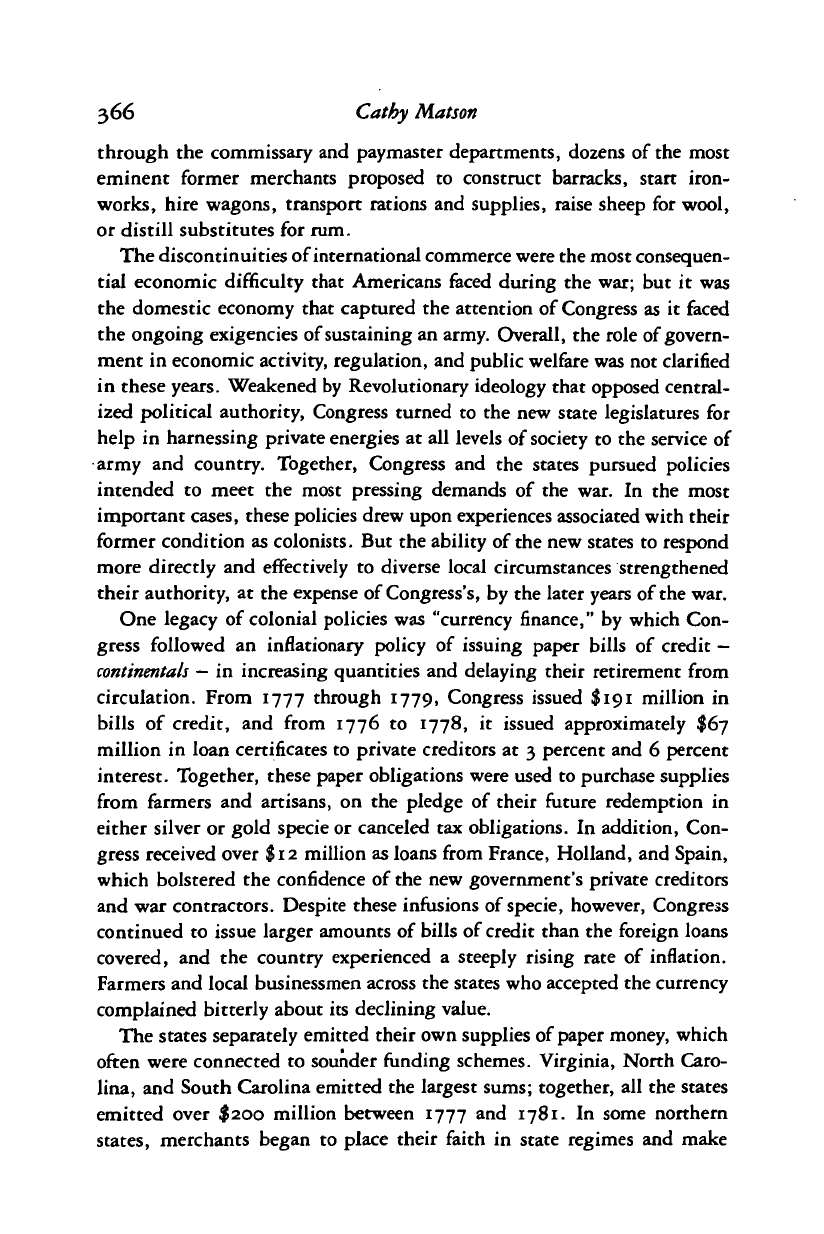
366 Cathy Matson
through the commissary and paymaster departments, dozens of the most
eminent former merchants proposed to construct barracks, start iron-
works, hire wagons, transport rations and supplies, raise sheep for wool,
or distill substitutes for rum.
The discontinuities of international commerce
were
the most consequen-
tial economic difficulty that Americans faced during the war; but it was
the domestic economy that captured the attention of Congress as it faced
the ongoing exigencies of sustaining an army. Overall, the role of govern-
ment in economic activity, regulation, and public welfare was not clarified
in these years. Weakened by Revolutionary ideology that opposed central-
ized political authority, Congress turned to the new state legislatures for
help in harnessing private energies at all levels of society to the service of
army and country. Together, Congress and the states pursued policies
intended to meet the most pressing demands of the war. In the most
important cases, these policies drew upon experiences associated with their
former condition as colonists. But the ability of the new states to respond
more directly and effectively to diverse local circumstances strengthened
their authority, at the expense of
Congress's,
by the later years of
the
war.
One legacy of colonial policies was "currency finance," by which Con-
gress followed an inflationary policy of issuing paper bills of credit
—
continentals —
in increasing quantities and delaying their retirement from
circulation. From 1777 through 1779, Congress issued $191 million in
bills of credit, and from 1776 to 1778, it issued approximately $67
million in loan certificates to private creditors at 3 percent and 6 percent
interest. Together, these paper obligations were used to purchase supplies
from farmers and artisans, on the pledge of their future redemption in
either silver or gold specie or canceled tax obligations. In addition, Con-
gress received over $12 million as loans from France, Holland, and Spain,
which bolstered the confidence of the new government's private creditors
and war contractors. Despite these infusions of
specie,
however, Congress
continued to issue larger amounts of bills of credit than the foreign loans
covered, and the country experienced a steeply rising rate of inflation.
Farmers and local businessmen across the states who accepted the currency
complained bitterly about its declining value.
The states separately emitted their own supplies of paper money, which
often were connected to sounder funding schemes. Virginia, North Caro-
lina, and South Carolina emitted the largest sums; together, all the states
emitted over $200 million between 1777 and 1781. In some northern
states,
merchants began to place their faith in state regimes and make
Cambridge Histories Online © Cambridge University Press, 2008
